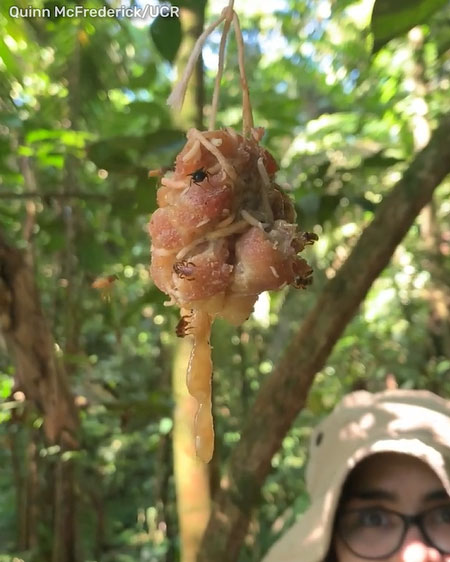The intestines of vulture bees contain bacteria different from those of vegetarian bees, enabling them to digest meat.
Bees typically do not eat meat. However, a stingless bee species in Costa Rica has evolved additional teeth to bite meat and possesses intestines more similar to those of vultures than other bees, according to a study published in the journal mBio on November 23. They are known as vulture bees.

This is the only type of bee in the world that uses non-plant food sources.
“This is the only type of bee in the world that has evolved to utilize non-plant food sources, a remarkable shift in dietary habits,” said Doug Yanega, an entomologist at the University of California, Riverside. Experts believe that vulture bees evolved into carnivorous creatures to escape fierce competition for nectar and pollen.
Their unusual diet is not the only strange aspect of vulture bees. “Although they cannot sting, not all vulture bees are defenseless. They consist of various species, from completely harmless to those that can bite, and some even secrete blistering agents in their jaws, causing painful blisters on the skin,” Yanega noted.
With their unique diet, scientists wondered if vulture bees have a gut microbiome different from that of vegetarian bees. To investigate, they hung bait consisting of raw chicken pieces on tree branches and applied ant repellent at various locations in both northern and southern Costa Rica.
The bait successfully attracted vulture bees and other scavenging species. As a result, the research team discovered that vulture bees store meat in small baskets on their hind legs, which stingless bees typically use for collecting pollen. “They have small chicken baskets,” said Quinn McFrederick, an entomologist at the University of California, Riverside.
When comparing vulture bees that eat only meat with those that consume both meat and flowers, as well as bees that only eat pollen, the team of experts found significant changes in the gut microbiome. “The microbiome of vulture bees contains many acidophilic bacteria. These are new bacteria that their relatives do not have. These bacteria are similar to those found in vultures, hyenas, and other scavengers, believed to help protect them from pathogens,” McFrederick explained.
Among the gut bacteria of vulture bees are Lactobacillus—bacteria found in fermented foods for humans—and Carnobacterium—bacteria related to meat digestion. The researchers have completed their initial study and are further investigating the role of bacteria in the overall health of the bees.


















































